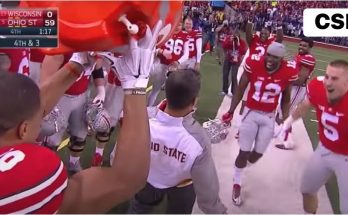Recently dismissed LSU head coach Brian Kelly is set to collect roughly $800,000 every month in contractual payments from the university, a staggering figure that has sent shockwaves throughout college football. The news comes after LSU announced Kelly’s departure following a disappointing season, marking an abrupt end to a tenure that began with immense promise and record-breaking expectations. While the Tigers move forward with their coaching search, the financial implications of Kelly’s exit are set to linger for years, igniting discussions about the ethics, economics, and future of multimillion-dollar buyouts in college sports.
When Brian Kelly first arrived in Baton Rouge in December 2021, it was heralded as one of the most ambitious hires in LSU history. The university pried him away from Notre Dame with a 10-year, $95 million contract, instantly making him one of the highest-paid coaches in the nation. LSU’s athletic department described the move as an investment in long-term stability, aiming to restore the Tigers to consistent championship contention. Kelly’s experience, polished image, and track record of success were seen as the perfect antidote to the turbulence that followed LSU’s 2019 national title run under Ed Orgeron.
In his first year, Kelly delivered flashes of brilliance. LSU upset Alabama in a thrilling overtime win and captured the SEC West title, reigniting belief among fans that the Tigers were back. Yet, despite early success, cracks began to appear. The 2023 and 2024 seasons failed to meet expectations, as inconsistency on defense and questionable in-game decisions led to several disappointing losses. By mid-2025, the program seemed to plateau rather than ascend. Tensions quietly grew behind the scenes between Kelly and university officials regarding recruiting strategy, player development, and public relations missteps that occasionally drew unwanted attention.
The breaking point reportedly came after LSU’s latest underwhelming finish in the SEC, where the Tigers stumbled against key rivals and failed to qualify for the College Football Playoff. Despite maintaining a respectable record and a top-25 recruiting class, boosters and administrators felt the trajectory no longer justified the extraordinary financial commitment. Kelly was dismissed, but his massive buyout clause—crafted to secure his long-term tenure—ensured that LSU would continue paying him long after his departure.
According to multiple reports, Brian Kelly’s post-dismissal compensation will total about $800,000 per month, a figure that could extend for several years depending on settlement terms and future employment offsets. For context, that’s roughly $9.6 million annually—an extraordinary amount for a coach no longer actively leading the program. Such payouts have become increasingly common in college football’s modern era, where elite coaches command NFL-level salaries and universities compete fiercely for top talent.
LSU’s situation mirrors similar high-profile cases across college athletics, where schools face the financial burden of buyouts that sometimes exceed entire athletic department budgets. For instance, Texas A&M’s recent separation from Jimbo Fisher cost the school over $70 million in guaranteed money, an NCAA record at the time. Now, LSU’s financial obligations to Kelly approach similar territory, adding fuel to the ongoing debate about fiscal responsibility in collegiate sports.
The issue goes beyond LSU’s balance sheet. Critics argue that these massive buyouts expose the imbalance between athletic spending and academic priorities. While coaches receive golden parachutes worth tens of millions, many athletic departments face budget cuts, and non-revenue sports struggle to survive. The optics of paying a dismissed coach nearly a million dollars a month are especially controversial at a time when universities nationwide are grappling with declining enrollment, economic uncertainty, and debates over student-athlete compensation.
Supporters of the decision, however, contend that LSU’s football program operates as a business enterprise whose success benefits the entire university ecosystem. Football revenue fuels scholarships, facilities, and exposure that enhance LSU’s national profile. From that perspective, the cost of parting ways with Kelly can be seen as a necessary investment to secure a better future. LSU’s leadership is reportedly confident that a new coaching direction, combined with the program’s elite recruiting base and brand power, will restore competitiveness and financial returns that justify the short-term expense.
Still, the scale of Kelly’s payout underscores how dramatically the economics of college football have evolved. Decades ago, even the most successful college coaches earned a fraction of today’s figures. Now, universities routinely offer contracts exceeding $100 million to attract top-tier leaders, and the risks associated with those commitments are monumental. For every Nick Saban or Kirby Smart who delivers sustained excellence, there are others whose tenures end prematurely, leaving their employers with years of financial obligations.
Brian Kelly’s case also highlights the changing dynamics of accountability in collegiate athletics. In previous eras, coaches might have been given more time to rebuild a program, especially when early success hinted at potential. Today’s environment, however, is fueled by instant gratification and heightened pressure from donors, fans, and media. With massive television contracts and playoff revenue at stake, patience is in short supply. A few disappointing seasons can erase goodwill and prompt drastic action, even when the financial fallout is severe.
For Kelly personally, the situation represents a bittersweet chapter in a storied coaching career. Before arriving at LSU, he had achieved remarkable success at Grand Valley State, Central Michigan, Cincinnati, and Notre Dame, amassing over 300 career wins and cementing his reputation as one of the most accomplished coaches of his generation. His decision to leave Notre Dame—a program steeped in tradition and stability—was a calculated gamble aimed at finally capturing a national championship, something that had eluded him despite consistent top-10 finishes.
Now, just a few years later, that ambition has dissolved into an expensive exit. While his time at LSU included notable victories and player development success stories, it ultimately fell short of the lofty expectations that accompanied his arrival. Yet, financially, Kelly remains insulated from the consequences of failure. His buyout ensures long-term stability regardless of whether he returns to coaching soon. Some insiders speculate that he may take a year off before considering future opportunities, potentially in television or another coaching role.
As LSU transitions to a new era, the university faces a delicate balancing act—maintaining fan enthusiasm while rebuilding trust in leadership decisions. Athletic Director Scott Woodward, who engineered the original Kelly hire, now carries the responsibility of finding a successor capable of both winning big and managing the pressures that come with LSU’s powerhouse reputation. Names like Dan Lanning, Mike Norvell, and even rising coordinators within the SEC have already surfaced as potential candidates, but whoever takes the helm will do so under intense scrutiny.
Meanwhile, the conversation around coaching buyouts continues to intensify. Lawmakers, university boards, and watchdog groups are increasingly questioning whether these massive contracts align with the mission of public institutions. Some advocate for reform measures, such as capping buyouts or restructuring agreements to include performance-based clauses. Others argue that as long as the market dictates such prices, change will be slow to come. The sheer revenue generated by college football—driven by billion-dollar TV deals and merchandising—continues to justify high-risk financial strategies in the eyes of many decision-makers.
In the end, Brian Kelly’s $800,000-per-month payout serves as both a symbol and a warning. It’s a symbol of how far college football has come as a business, where coaching salaries rival Fortune 500 executive packages. But it’s also a warning about the unsustainable trajectory of athletic spending, where one disappointing season can trigger multimillion-dollar consequences that ripple across a university.
For LSU, the challenge now lies in turning this costly chapter into a lesson learned—about patience, perspective, and the true price of chasing greatness. For the rest of college football, it’s yet another reminder that the modern coaching carousel spins faster and more expensively than ever before.
Brian Kelly may no longer roam the sidelines in Baton Rouge, but his financial shadow will loom large over LSU for years to come. Whether viewed as justified compensation or excessive indulgence, his buyout epitomizes the complex intersection of ambition, money, and expectation that defines college sports today. And as the Tigers look ahead to their next leader, one thing is certain: in the high-stakes world of college football, success is measured not only in victories, but in the massive sums paid when those victories fail to materialize.



